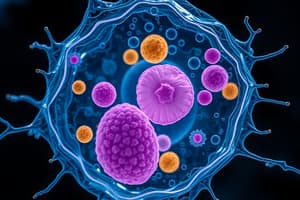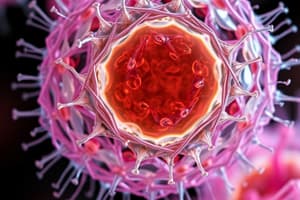Podcast
Questions and Answers
ما المقصود بمصطلح الكينيتوز في علم الأحياء؟
ما المقصود بمصطلح الكينيتوز في علم الأحياء؟
- التنظيم الدقيق للنشاط الخلوي خلال دورة الخلية
- تعديلات في الخلايا نتيجة زيادة الحركة
- مجموعة من التكيفات الخلوية التي تحدث عند حركة الكائنات أو خلاياها (correct)
- قدرة الخلايا على الانقسام بشكل سريع
ما الدور الحرج الذي يلعبه الكينيتوز في تنظيم دورة الخلية؟
ما الدور الحرج الذي يلعبه الكينيتوز في تنظيم دورة الخلية؟
- المساعدة في ضمان أن تحدث انقسامات الخلايا بتناغم مع حركة الكائن (correct)
- التأكد من وجود خلايا نشطة بشكل غير منتظم
- تسريع عملية انقسام الخلايا
- ضمان حدوث انقسام الخلايا بشكل فجائي
كيف تؤثر كائنات مثل البكتيريا مثل إشريشيا كولاي (E.coli) بالكينيتوز؟
كيف تؤثر كائنات مثل البكتيريا مثل إشريشيا كولاي (E.coli) بالكينيتوز؟
- تخفيض سرعة انقسام الخلايا
- تغير وظائف الخلايا بشكل كامل
- زيادة حجم الخلايا
- ضبط نمو وانقسام الخلايا وفقًا لإيقاع جهاز الهضم (correct)
ما هو دور نقاط فحص دورة الخلية؟
ما هو دور نقاط فحص دورة الخلية؟
كيف يسهم الكينيتوز في ضمان وجود تعاون بين حركة الكائن ودورة نشاط خلاياه؟
كيف يسهم الكينيتوز في ضمان وجود تعاون بين حركة الكائن ودورة نشاط خلاياه؟
متى يحدث التأثير الأساس لعملية تنظيم دورة الخلية؟
متى يحدث التأثير الأساس لعملية تنظيم دورة الخلية؟
ما هي الأهمية الرئيسية لنقطة التفتيش G1 في دورة الخلية؟
ما هي الأهمية الرئيسية لنقطة التفتيش G1 في دورة الخلية؟
ما هو الدور الرئيسي لمسار البولارية الخلوية المستوية (PCP) في تنظيم نشاطات الخلايا أثناء تشكيل الأنسجة؟
ما هو الدور الرئيسي لمسار البولارية الخلوية المستوية (PCP) في تنظيم نشاطات الخلايا أثناء تشكيل الأنسجة؟
ما دور جزيئات Rho GTPases في تنظيم دورة الخلية؟
ما دور جزيئات Rho GTPases في تنظيم دورة الخلية؟
كيف تساهم المايكروتيوبولات في تكامل خلايا الجسم مع حركة الكائنات؟
كيف تساهم المايكروتيوبولات في تكامل خلايا الجسم مع حركة الكائنات؟
لماذا يجب على الخلايا أن تحدد ما إذا كانت تتحرك أو ثابتة قبل مرورها من خلال نقطة التفتيش G1؟
لماذا يجب على الخلايا أن تحدد ما إذا كانت تتحرك أو ثابتة قبل مرورها من خلال نقطة التفتيش G1؟
ما هو دور نقط التفتيش في الحفاظ على استقرار الجينوم ومنع حدوث أخطاء قد تؤدي إلى أمراض مثل السرطان؟
ما هو دور نقط التفتيش في الحفاظ على استقرار الجينوم ومنع حدوث أخطاء قد تؤدي إلى أمراض مثل السرطان؟
Study Notes
Understanding Kinetosis: Cellular Adaptations during Movement and Cell Cycle Regulation
As we navigate the intricate realm of cellular processes, kinetosis emerges as a fundamental concept, particularly relevant to our discussion of cell cycle regulation. Kinetosis refers to the set of cellular adaptations that occur when an organism or its cells are in motion, such as when cells in a moving organism, like a flagellate, adjust their behavior and mechanics to maintain proper function.
Movement and Cell Cycle Coordination
In the context of cell cycle regulation, kinetosis plays a critical role in ensuring that cells can adapt to changes in their environment, particularly movement. As cells divide, they must coordinate their activities to maintain their proper orientation and function within their organism. Kinetosis aids in ensuring that cell division occurs in synchronization with an organism's motion.
For example, consider bacteria such as Escherichia coli (E. coli). E. coli cells are subjected to kinetosis during their migration through the gut, and their cell cycle is regulated accordingly. The bacterium's growth and division are adjusted to the rhythm of the host's digestive system, allowing the bacteria to move freely and efficiently throughout the gut.
Cell Cycle Checkpoints and Kinetosis
Cell cycle checkpoints are a set of control mechanisms that ensure cells progress through the cell cycle in a precise and ordered manner. These checkpoints are critical for maintaining genomic stability and preventing errors that could lead to diseases such as cancer. Kinetosis can influence cell cycle checkpoints, ensuring that cells can adapt to movement and coordinate their activities with the organism's motion.
The G1 checkpoint, for instance, ensures that a cell is prepared to enter the S phase, where it will replicate its DNA. During kinetosis, cells must be able to determine whether they are moving or stationary before deciding to proceed through this checkpoint. If a cell is stationary, it can move forward through the cell cycle. However, if the cell is experiencing movement, it may be necessary to delay cell cycle progression until the cell has stabilized its position and orientation within the organism.
Kinetic Signaling and the Cell Cycle
To adapt to movement, cells must sense and respond to changes in their environment. In the context of kinetosis, these changes are typically mediated by signaling pathways that regulate cell cycle progression. Some of the key signaling molecules and pathways involved in kinetosis and cell cycle regulation include:
- Microtubules: These are essential for maintaining cell shape and coordinating cell division. Microtubules also play a role in sensing and responding to mechanical forces, allowing cells to adapt to movement.
- Rho GTPases: These are a family of signaling molecules that regulate actin cytoskeletal dynamics and cell cycle progression. Rho GTPases are critical for sensing and responding to mechanical forces, allowing cells to adapt to movement.
- Planar cell polarity (PCP) pathway: This pathway is essential for coordinating cellular activities during tissue morphogenesis. The PCP pathway helps cells adapt to movement by ensuring that they orient themselves in response to mechanical forces and cues within their environment.
Evolutionary Insights into Kinetosis and Cell Cycle Regulation
Kinetosis and cell cycle regulation have been observed in various organisms, from unicellular bacteria to multicellular organisms such as plants and animals. The evolutionary insights into kinetosis and cell cycle regulation suggest that these processes have evolved to enable the optimization of cellular function within the context of an organism's environment.
For instance, studies of bacteria such as Caulobacter crescentus have revealed that kinetosis and cell cycle regulation are essential for ensuring that cells can adapt to changes in their environment and maintain their proper orientation within their habitat. In contrast, studies of multicellular organisms such as Drosophila melanogaster have revealed that kinetosis and cell cycle regulation are essential for ensuring that cells can adapt to movement and coordinate their activities with the organism's motion.
Conclusion
Kinetosis is a critical concept in the context of cell cycle regulation. By enabling cells to adapt to movement, kinetosis allows cells to maintain their proper orientation and function within their organism. Kinetosis influences cell cycle checkpoints, signaling pathways, and evolutionary processes, ensuring that cells can adapt to changes in their environment and maintain genomic stability and cellular function. As we continue to explore these intricate processes, it is clear that kinetosis and cell cycle regulation are essential for maintaining proper cellular function and ensuring the survival and growth of organisms.
Studying That Suits You
Use AI to generate personalized quizzes and flashcards to suit your learning preferences.
Description
Test your knowledge on kinetosis, cellular adaptations during movement, cell cycle coordination, checkpoints, and kinetic signaling. Explore how kinetosis influences the cell cycle and ensures proper cellular function within an organism.




